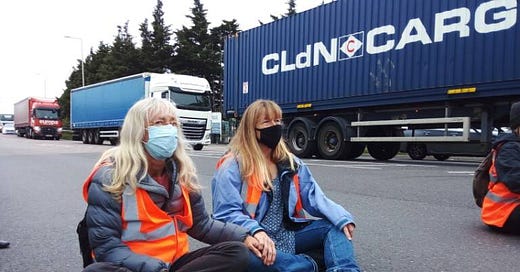Insulate Britain and the politics of protest: Interview with Michael Heaney
The author, documentary filmmaker and political scientist tells us what we can expect from the future of climate protest.
Micheal Heaney is a political scientist who specialises in social movements, networks and political parties. Currently a lecturer in Politics and Research Methods at the University of Glasgow, he is the co-author of Party in the Street: The Antiwar Movement and the Democratic Party after 9/11 and co-creator of the documentary The Activists: War, Peace, and Politics in the Streets.
Ours to Save talks to him about his research at COP26 and the tactics of protesters, including Extinction Rebellion and its notorious splinter group Insulate Britain.
Your academic work has focused on protest. Do you think that lobbying governments and public climate protests have the power to influence meaningful political action? Or is this really in the hands of major corporations?
Yes, I think that citizens and their lobbying can definitely make a difference. I think that everything fits together. You laid out three sets of actors here: You’ve got citizens, the government and corporations. These actors are all part of the same system. But they want different things: Politicians want to be re-elected, corporations want to make profits and sell their products, people want better lives for themselves and their families.
You're suggesting that corporations may have more power than citizens do. And part of the reason for that is that it’s hard for citizens to act collectively, whereas it's easier for corporations and governments to act together. As political scientists we call this a ‘collective action problem’.
But it’s definitely possible for citizens to put pressure on the government and then for the government to put pressure on corporations, and likewise, it's possible for citizens to put pressure on corporations and then for corporations to put pressure on the government.
Now, to say it can be done doesn't mean it's done easily; the challenge is getting citizens to put pressure on those two types of actors. Creating that pressure is very challenging; it's doable, but not easy.
Is it in the UK government’s interests to respond to the demands of protestors or are they too invested in supporting corporations, given that net-zero is not yet economically viable?
Well yes, it can be in the government's interest to respond to protesters. It isn't necessarily always in their interest.
It really depends on the relationship between the protests and the political system. So, for example, if you take the current government right now, the Tories have an unchallenged majority in Parliament. The Tories don't have a lot of people among their constituents who care about protest. So, under these conditions, it's easier for the Tory government to ignore the protesters.
Now the other parties that are challenging the Tories, like Labour and the SNP, have more protesters in their constituencies, so those parties are going to listen to the protesters and, of course, it matters how you do the protests.
I think the answer is yes, it can, but it depends on the configuration of the political system and the relationship between the protesters and the government. Right now, the government knows these are not their constituents.
So, there are two options: One option is that those protesters have got to get their people into government so they have more power. Another strategy is to try to get the Tories to listen to them – that's more challenging but that's also a possibility.
Lately, climate activism has been characterised by civil disobedience, primarily from Extinction Rebellion and its splinter group Insulate Britain. What do you think has driven this movement towards direct action?
Hahaha. That’s a super hard question! I think there's no one answer and, actually, I just finished teaching that to a class on social movements. That was a big topic that we talked about all semester.
The short answer is there's no one right answer, it's a complex question. There are a couple of things that drive the turning to civil disobedience and more destructive forms of action:
One is frustration; people feeling like it's an urgent problem and they're not getting an immediate answer. So, frustration leads people to choose the civil disobedience approach.
Another answer is who the people are.
The kind of people who participate in these groups personally or philosophically have a preference for these more disruptive tactics. I like to read books they like to, you know, block intersections.
And the other answer would be that this does get attention. It's actually a relatively easy way to get attention.
And how effective is this as a form of protest?
It's got aspects that are effective, and it's got aspects that are not. The effective part of it is that it does get people's attention. And it does get people talking about it. And even if people don't like the strategies, you can still potentially have positive effects.
So, for example, in my class on social movements, I just got done reading essays and a number of students wrote essays both about Extinction Rebellion and about Insulate Britain.
And some of the students say things like:
“Because I don't think that these disruptive tactics are a good idea, I'm going to do this other thing that’s more positive and more constructive.”
So, actually, one role those disruptive tactics can have is they can inspire people to take other kinds of actions. It is possible that the disruptive people inspire the constructive people.
It's also possible that just by getting the issue on the agenda that it gets more people interested and more people active. Of course, the flip side of it is that people’s lives get interrupted and that bothers them and then they get put off wanting to help the cause. Both of those things are happening at the same time.
There is something in social movement theory called the ‘radical flank effect’. It was invented before I was born.
The idea of a radical flank is that when the radical flank gets mobilised, other power holders don't want to deal with the radical flank so they're more incentivised to deal with more moderate actors.
Say you have Insulate Britain or Extinction Rebellion engage in some kind of really disruptive action like the block intersections. And let’s say I'm a person who thinks we need to do something about climate change, but I don't like that action, I'm not going to say “To hell with Extinction Rebellion, let the planet burn”. I'm not going to say that because I have future generations I care about. But I might not want to work with Extinction Rebellion - I might choose some other approach.
So, I think on balance it's good to have it in this as part of the approach, but it can't be the only approach.
In the past, much of your research has been based in the United States. What differences and similarities do you see in the ways in which climate protests are being held and responded to there?
There’s a lot of similarity. You know, part of the difference might be because there's less of an urban-rural divide here, and I think that the urban-rural divide characterises both places. You know in the United States you've got big expanses of land that are sparsely populated. That's not as true here in the United Kingdom. Northern Scotland is not that populated. But I think the United States is a little more rural.
You almost might say that the climate movement is one of those movements that’s such a transnational movement that it has the same arguments, the same concerns and the same tactics in different countries.
Do you think future generations will look back favourably on our efforts to counteract the effects of climate change or do you think they’ll see a culture of entitlement and unchecked greed?
Well, no. Do I think that they'll look back and think we did a good job? No, they won't. I don't think [greed] is the problem either. I think the problem is not knowing how to coordinate a solution.
Ever since I was younger, I can remember people saying “recycle”, “don't waste food”, “don’t waste water”. But these are really not at the heart of the problem.
The heart of the problem is the way that we produce and use energy. Those are the big issues and they're really beyond our control as individuals.
To some extent, greed is involved because the existing companies that depend on fossil fuels have a vested interest in the way that things work now. But there are still technological issues: How are you gonna make green energy profitable – and people don't really know what a good approach is to deal with the problem.

It is a really complex problem because it requires collective action on a global level, and there are all sorts of things that are being managed, like population growth.
For the last 70-years, a big part of the agenda has been development, especially for the developing world by definition. Places like India are growing; China has stemmed its growth, but it's still managing a fairly large population.
So how do you deal with these issues? You want every human being born on the planet to have a good life. You want them to have clean water and medical care. You want every child to be able to grow up to be 86 years old if they can be – or older.
We've got these goals for development and health and wellbeing. And then we've got these goals to manage the overall environmental situation. And then the development issues are being dealt with on a nation-by-nation basis, but environmental issues are global as a whole, it's extraordinarily complex.
So I think this will be looked back at as a period where we didn't really know what the right approach is.
My hope for the next 20 years would be that we can find approaches to try to deal with both of those things at the same time. Either we're gonna find a way to mitigate these problems or we're gonna see increased war. We're going to see increased climate destruction; the question is whether we also see increased starvation and human suffering in war.
The climate summit has also drawn our attention back to several toxic practises; from the pollution of oceans and waterways to the shipment of household waste abroad.
What kind of changes would you like to see the UK government enact over the next five years?
I'm willing to give you my opinion. Everything you've asked me up till now I think fits within my scholarly expertise – on this question I have an opinion as a private citizen.
I think I would like to see that the government – not just in the U. K. but the governments of all the other large nations of the world, including the United States and India and China and Russia – do the following: More public investment in green technologies, more public investment in green fuels.

Right now, the whole system is structured to harness fossil fuels, and so there are vested interests in that. And that's what you refer to as greed, I would call it vested interest. Because those organisations have to advance the interests of their shareholders – that’s what they do. But I think that you need the government to step in and just make it profitable for people to use green energy.
Al Howard is a staff writer at Ours to Save, interested in space, art and saving the planet. You can follow her on Instagram.






